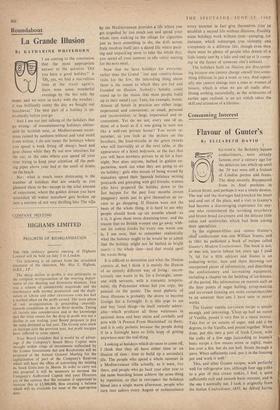Roundabout
La Grande Illusion
By KATHARINE WH1TEHORN
And 1 am not just talking of the holidays that go wrong: of mountaineering holidays obliter- ated by Scottish mist, or Mediterranean excur- sions ruined by sunburn without and total recall from within; I do not mean the holidays where you spend a week living off sheep's head and goat cheese while they fly out new intestines for the car, or the ones where you spend all your time trying to keep your attention off the peel- ing pipes above your bed or the smell of drains on the beach.
No : what is much more distressing is the number of holidays that are exactly as you planned them to be—except in the total amount of enjoyment; where the golden dream you have nourished all winter somehow gets broken up into a number of not very thrilling bits. The villa by the Mediterranean provides a life where you get stupefied by too much sun and spend your whole time walking to the village for cigarettes just to have something to do; the drift across Italy resolves itself into a dazed life where pack- ing and unpacking seem to take the whole day; you spend all your summer in idle valley waiting for the next meal. • Now that we have holidays for everyone, rather than the Grand ":our and country-house visits for the few, the interesting thing about them is the extent to which they are fed and founded on illusion. Nobody's holiday could stand up to the vision that most people build up in their mind's eye. Take, for example, hotels. Almost all hotels in practice are either large, impersonal and convenient; or small, personal and inconvenient; or large, impersonal and in- convenient. Yet do we not, every one of us, think of a hotel as if it was going to turn out like a well-run private house? You never re- member, as you look at the picture on the brochure, the loud-mouths in the green tweeds who will inevitably sit at the next table, or the appearance of a hotel bedroom, or the tact that you will have nowhere private to sit for a fort- night. Nor does anyone, bathed in golden ex- pectation, work out what they are going to do on holiday : girls who dream of 'being wooed by matadors spend their Spanish holidays writing postcards and gossiping with girl friends; women who have prepared the holiday down to the l'ast hairpin for the past four months invent imaginary needs just to give themselves an ex- cuse to go shopping. if illusion were not the basis of the whole thing, it is hard to see why people should book up six months ahead—as it is, it gives them more dreaming-time; and the reason that no British woman can go away with- out six cotton frocks for every one warm one is, I am sure, that to remember realistically what the balance ought to be would be to admit that the holiday might not be bathed in bright sunshrle the whole time—and that would spoil the whole thing.
It is difficult to determine just what the illusion consists of, but I think it is mainly the illusion of an entirely different way of living : uncon- sciously one wants to be, for a fortnight, some- one with servants, with a romantic tempera- ment, the Polynesian whose but you copy, the peasant on the poster. The most pathetic of these illusions is probably the desire to become foreign for a fortnight. It is this urge to see and buy local things—in itself entirely admir- able—which produces all those waitresses in national dress and beer steins and cowbells and pots with 'A Present From Marienbad' on them; and it is only pathetic because the people doing it in a fortnight have so little hoiN of getting anywhere near the real thing.
Looking at holidays which do seem to come off, I think that they all have either time or an illusion of time: time to build up a secondary .life. The people who spend a whole summer in a Mediterranean villa actually, as it were, live there, and people who go back year after year to the same boarding house achieve the same thing by repetition, so that in retrospect the holidays blend into a single warm afternoon; people who turn into sailors every August or mountaineers every summer in fact give themselves time to establish a second life, without illusions. .Possibly some holidays work without time—camping, for instance, which submerges you violently and completely in a different life; though even then there must be plenty of people who dream of a little lonely tent by a lake and end up at le camp- ing in the fumes of someone else's exhaust.
The holidays built' on illusion are disappoint- ing because one cannot change oneself into some- thing different in just a week or two. And especi- ally one cannot change into a man or woman of leisure, which is what we are all really after. Doing nothing successfully, as the aristocrats of earlier ages realised, is an art which takes the skill and attention of a lifetime.


































 Previous page
Previous page